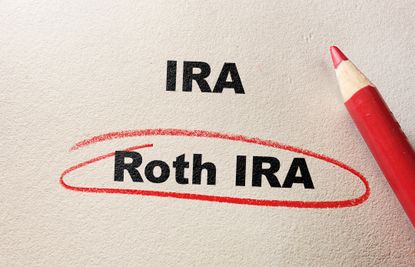How To Convert a Traditional IRA to a Roth After 60
You can convert a traditional IRA to a Roth no matter your age. But if the conversion boosts your income, it could have taxing consequences.


It's not difficult to convert a traditional IRA to a Roth if you mind your taxes. And you can contribute to a traditional IRA at any age as long as you have earned income. But can someone who is age 70½ still roll over money from a traditional IRA to a Roth in retirement? Do you need to have earned income to make a successful conversion? Let's delve into those answers and find out what anyone making an IRA conversion should consider before rolling over funds to a Roth IRA.
Who can convert a traditional IRA to a Roth IRA?
There's no age limit or income requirement to be able to convert a traditional IRA to a Roth. You must pay taxes on the amount converted, although part of the conversion will be tax-free if you have made nondeductible contributions to your traditional IRA.
Once the money is in the Roth, you can take tax-free withdrawals. (You may have to pay taxes on any earnings withdrawn within five years of the conversion, but only after you've withdrawn contributions and converted amounts.) See Roth IRA Basics: 10 Things You Must Know for more information.

Sign up for Kiplinger’s Free E-Newsletters
Profit and prosper with the best of expert advice on investing, taxes, retirement, personal finance and more - straight to your e-mail.
Profit and prosper with the best of expert advice - straight to your e-mail.
Possible financial consequences of a conversion
Be careful before making a big conversion in one year, however, because it can have a ripple effect on other areas of your finances. The conversion will be included in your adjusted gross income, which could bump some of your income into a higher tax bracket and could also cause you to pay more for your Medicare premiums and higher taxes on your Social Security benefits.
The Social Security Administration (SSA) determines who pays an income-related monthly adjustment amount (IRMAA) based on the income reported two years prior. So, the SSA looked at your 2022 tax returns to see if you must pay an IRMAA in 2024. Similarly, SSA will examine your 2023 tax returns to determine whether you must pay IRMAA in 2025.
If your adjusted gross income (plus tax-exempt interest income) is more than $103,000 if you're single or $206,000 if married filing jointly, you will have to pay the Medicare high-income surcharge for Parts B and D.
In 2024, people subject to the surcharge pay an additional $69.90 to $419.30 per person each month, depending on their income, for Medicare Part B premiums. They also pay a high-income surcharge of $12.90 to $81.00 above their Part D premiums. See Medicare Premiums 2024: IRMAA for Parts B and D for more information.
The extra income from the conversion could also increase the portion of your Social Security benefits that is subject to income taxes. See Do You Have to Pay Taxes on Social Security Benefits? for details.
Keep an eye on RMDs (required minimum distributions) the year you convert your traditional IRA
Keep in mind that rolling money over from a traditional IRA to a Roth after 70½ won't reduce your RMD for the year of the conversion; the required withdrawal is based on your IRA balance as of the end of the previous year. But it can reduce your RMDs for future years.
Instead of making one big conversion, consider rolling over a portion of the money from a traditional IRA to a Roth every year, with a close eye on the top of your tax bracket and income limits for the Medicare high-income surcharge and Social Security taxes.
Related Content
Get Kiplinger Today newsletter — free
Profit and prosper with the best of Kiplinger's advice on investing, taxes, retirement, personal finance and much more. Delivered daily. Enter your email in the box and click Sign Me Up.

As the "Ask Kim" columnist for Kiplinger's Personal Finance, Lankford receives hundreds of personal finance questions from readers every month. She is the author of Rescue Your Financial Life (McGraw-Hill, 2003), The Insurance Maze: How You Can Save Money on Insurance -- and Still Get the Coverage You Need (Kaplan, 2006), Kiplinger's Ask Kim for Money Smart Solutions (Kaplan, 2007) and The Kiplinger/BBB Personal Finance Guide for Military Families. She is frequently featured as a financial expert on television and radio, including NBC's Today Show, CNN, CNBC and National Public Radio.
- Donna LeValleyPersonal Finance Writer
-
 Federal Reserve Meeting: Updates and Commentary
Federal Reserve Meeting: Updates and CommentaryKiplinger experts provide commentary and analysis on the November Federal Reserve meeting.
By Kiplinger Staff Last updated
-
 Market Reaction to Election Results: What the Experts Are Saying
Market Reaction to Election Results: What the Experts Are SayingJobs Report Election uncertainty has been removed from the list of investors' worries, helping equities soar.
By Dan Burrows Published
-
 Are You an Estate Planning Procrastinator? Where to Start
Are You an Estate Planning Procrastinator? Where to StartQuit putting it off, because it's vital for you and your heirs. From wills and trusts to executors and taxes, here are some essential points to keep in mind.
By Alex Diaz, MBA, CFP® Published
-
 Is It Too Late to Do a Roth Conversion if You're Retired?
Is It Too Late to Do a Roth Conversion if You're Retired?The short answer is: Not at all. Roth conversions can be great tax-saving strategies … for the right people. Are you a good candidate?
By Arrin Wray Published
-
 Five Options for Retirees Who No Longer Need Life Insurance
Five Options for Retirees Who No Longer Need Life InsuranceIf you're retired and you've checked with your financial planner that life insurance is no longer vital, here are five ways you can turn it to your advantage.
By Evan T. Beach, CFP®, AWMA® Published
-
 Medicare Drug Plans Are Getting Better Next Year. Some Will Also Cost More.
Medicare Drug Plans Are Getting Better Next Year. Some Will Also Cost More.Upcoming changes to the Part D drug benefit, including a $2,000 cap on out-of-pocket medication, will benefit millions of Americans. But higher premiums may also be on the way
By Susan Jaffe | KFF Health News Published
-
 Five Financial Planning Secrets of Millionaires
Five Financial Planning Secrets of MillionairesYou might be surprised: Most millionaires don't feel rich. Instead, they have smart goals, discipline and a little help along the way.
By Kevin Dwyer, CFP®, CLU® Published
-
 Here's Why You Shouldn't Put All Your Money Into Roth IRAs
Here's Why You Shouldn't Put All Your Money Into Roth IRAsConverting a tax-deferred account to a Roth can be a good strategy for lowering future taxes, but moving all of your money at once is typically not recommended.
By Joe F. Schmitz Jr., CFP®, ChFC® Published
-
 Three Advantages of These Underrated Accounts for Retirees
Three Advantages of These Underrated Accounts for RetireesUsing taxable accounts for some retirement savings in the 10 years before and after retirement can give you greater flexibility and benefit your heirs.
By Evan T. Beach, CFP®, AWMA® Published
-
 Are Election Jitters Shaking Up Your Investing Strategy?
Are Election Jitters Shaking Up Your Investing Strategy?Many investors are retreating to safer investments until after the election, but doing so could result in missed opportunities. Here's what to do instead.
By Matthew Sommer, Ph.D. CFA® Published